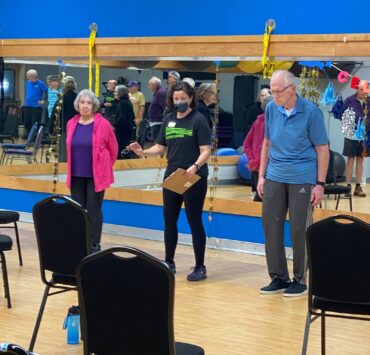 It’s 3 p.m. on a Thursday and upstairs at Gig Harbor’s Tom Taylor YMCA, a group of about 23 men and women are gathering, pulling up chairs to face mirrors, laughing and checking in on each other while the music of Fleetwood Mac plays in the background. Assistant Rock Steady Boxing coach Jennifer “Taz” Vazquez turns the music off and says: “OK, everybody! Find your chair!” Three participants head for the same chair. “It’s a fight,” Vazquez jokes. The room erupts in laughter while head coach JJ Hudson steadies a couple of individuals and guides them to their own spots.
It’s 3 p.m. on a Thursday and upstairs at Gig Harbor’s Tom Taylor YMCA, a group of about 23 men and women are gathering, pulling up chairs to face mirrors, laughing and checking in on each other while the music of Fleetwood Mac plays in the background. Assistant Rock Steady Boxing coach Jennifer “Taz” Vazquez turns the music off and says: “OK, everybody! Find your chair!” Three participants head for the same chair. “It’s a fight,” Vazquez jokes. The room erupts in laughter while head coach JJ Hudson steadies a couple of individuals and guides them to their own spots.
All these folks have one major thing in common: They all have neurodegenerative Parkinson’s disease. They are all here to improve their balance, slow its progression, gain strength, increase their range of motion and improve their hand-eye coordination through Rock Steady Boxing (RSB), a high-intensity exercise.
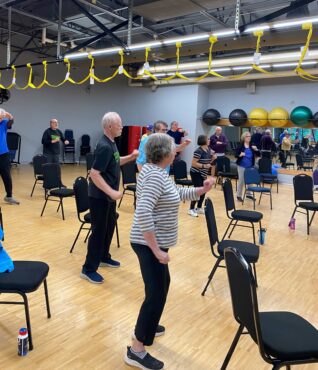 The energy in the room is electric. Warmup exercises begin with simple back-and-forth steps. Some participants make bigger steps than others. Some need to hold onto the backs of their chairs. All are thoroughly engaged. Vazquez asks “silly” questions to get them moving forward and backward, like, “Would you rather moo like a cow or squeak like a mouse?”
The energy in the room is electric. Warmup exercises begin with simple back-and-forth steps. Some participants make bigger steps than others. Some need to hold onto the backs of their chairs. All are thoroughly engaged. Vazquez asks “silly” questions to get them moving forward and backward, like, “Would you rather moo like a cow or squeak like a mouse?”
“I don’t want to be anything!” a woman says, moving backward. Hudson and Vazquez laugh while they pose another question, “Would you rather live in a treehouse or an igloo?”
“Oooh, we’ve got a couple of iglooites!” Vazquez notices.
“Why the igloo?” Hudson asks.
“You don’t have to climb any stairs,” a man roars and the room erupts, understanding the disease’s challenges.
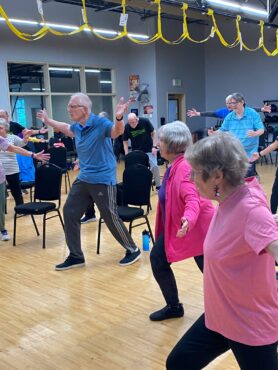 RSB is a national nonprofit organization founded in 2006 by Marion County, Indiana, prosecutor Scott C. Newman, who was diagnosed with Parkinson’s at age 40. Its mission is to improve the quality of life of people with Parkinson’s through a noncontact, boxing-based fitness curriculum. There are now over 844 affiliates worldwide. In Washington state, there are 18 RSB locations, with three of them in Pierce and Kitsap County: Gig Harbor, Tacoma and Puyallup. The next closest locations are in the Kent and Seattle areas.
RSB is a national nonprofit organization founded in 2006 by Marion County, Indiana, prosecutor Scott C. Newman, who was diagnosed with Parkinson’s at age 40. Its mission is to improve the quality of life of people with Parkinson’s through a noncontact, boxing-based fitness curriculum. There are now over 844 affiliates worldwide. In Washington state, there are 18 RSB locations, with three of them in Pierce and Kitsap County: Gig Harbor, Tacoma and Puyallup. The next closest locations are in the Kent and Seattle areas.
Hudson, whose father had Parkinson’s, founded the RSB South Sound Affiliate at the Gig Harbor YMCA in 2017. Vazquez, whose background is in the martial arts and Tae Bo cardio kickboxing, joined him in 2018.
To participate in the RSB program at the YMCA, you do have to be a member. However, you can observe a class for free, and there are several Parkinson’s peer support groups at the YMCA in Tacoma and Gig Harbor. You don’t need to be a member to attend a support group.
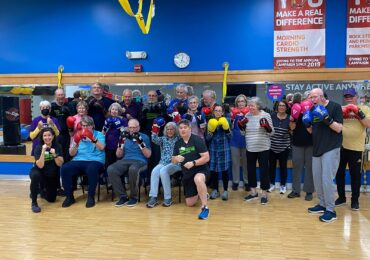 According to the Parkinson’s Foundation, nearly one million people in the United States are living with the disease. It is the second most common neurodegenerative disease after Alzheimer’s. Typically, symptoms of Parkinson’s show up in older adults, but there are cases of early onset in younger people — think of the actor Michael J. Fox. The disease’s process begins early, when individuals are in their 20s or 30s, yet symptoms are not visible for many years later.
According to the Parkinson’s Foundation, nearly one million people in the United States are living with the disease. It is the second most common neurodegenerative disease after Alzheimer’s. Typically, symptoms of Parkinson’s show up in older adults, but there are cases of early onset in younger people — think of the actor Michael J. Fox. The disease’s process begins early, when individuals are in their 20s or 30s, yet symptoms are not visible for many years later.
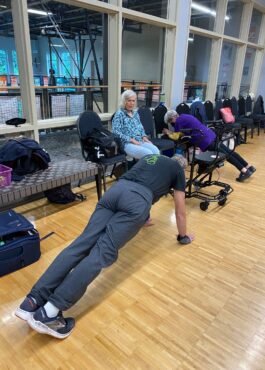 Parkinson’s affects everyone differently; however, many patients experience:
Parkinson’s affects everyone differently; however, many patients experience:
- Tremors, mainly at rest or in the hands
- Slowness and paucity of movement
- Limb stiffness
- Gait and balance problems
- Difficulty speaking clearly
- Nonmotor symptoms such as depression, anxiety, apathy, hallucinations, sleep disorders, loss of sense of smell and a variety of cognitive impairments
Many studies show that exercise and subsequent increases in dopamine-producing neurons help to improve mood and lower stress. Hudson and Vazquez explained that high-intensity physical therapy, like Rock Steady Boxing, can help alleviate some of the effects of Parkinson’s disease by improving posture, the core, balance, agility, rhythm, gait, range of motion, motor skills and hand-eye coordination.
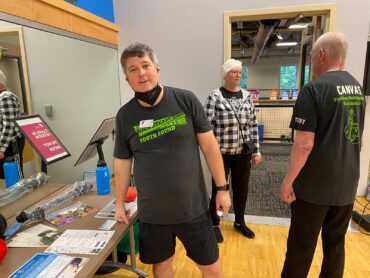 Parkinson’s Foundation has recognized RSB as one of three accredited exercise education programs. The program delivers the most up-to-date, scientifically based education for exercise professionals working with people who have Parkinson’s.
Parkinson’s Foundation has recognized RSB as one of three accredited exercise education programs. The program delivers the most up-to-date, scientifically based education for exercise professionals working with people who have Parkinson’s.
Back in the classroom, it’s getting time for the “ring-side event” portion. Participants have moved their chairs to the side, rolling the big, heavy bags to the center, and are putting on their colorful boxing gloves. The music pumps up the energy with Survivor’s “Eye of the Tiger” and the coaches instruct, “Hands up! 4-3-2-1! Jab! Cross hook! Uppercut! Nice job! Keep those hands up!” Three boxers are at each bag, taking three-minute turns through the routine, encouraging one another along the way.
 “Good, Jeannie! You did it!” Hudson cheers. “Keep your hands up! Jab! Jab! Cross!”
“Good, Jeannie! You did it!” Hudson cheers. “Keep your hands up! Jab! Jab! Cross!”
At the end of the 90-minute class, the boxers are clearly tired. Vazquez shouts, “Y’all are sooo amazing!”
Hudson follows with a call: “Who are we?” and the boxers refrain, “Rock Steady!”
“What do we do?”
“Fight! Fight! Fight!”
At the end, participants circle, sharing a cheer that vows not to let this disease destroy them. They know that they’re literally in the battle of their lives and they’re fighting back with all they have. It’s not only the exercise — it’s the camaraderie that keeps them coming back each week.
Participant Dean Smith said it best: “I just love the people. For me, it prevents Parkinson’s from getting worse. It’s a good, healthy thing to do. Oh, and the coaches — they’re great.”




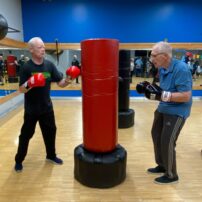
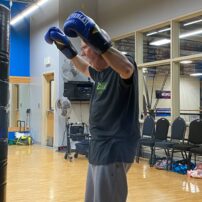
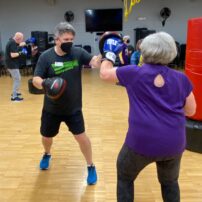
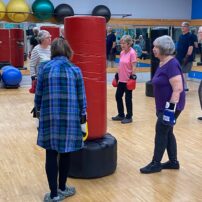
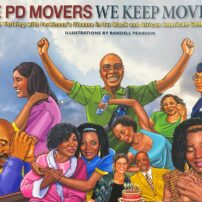

























Comments